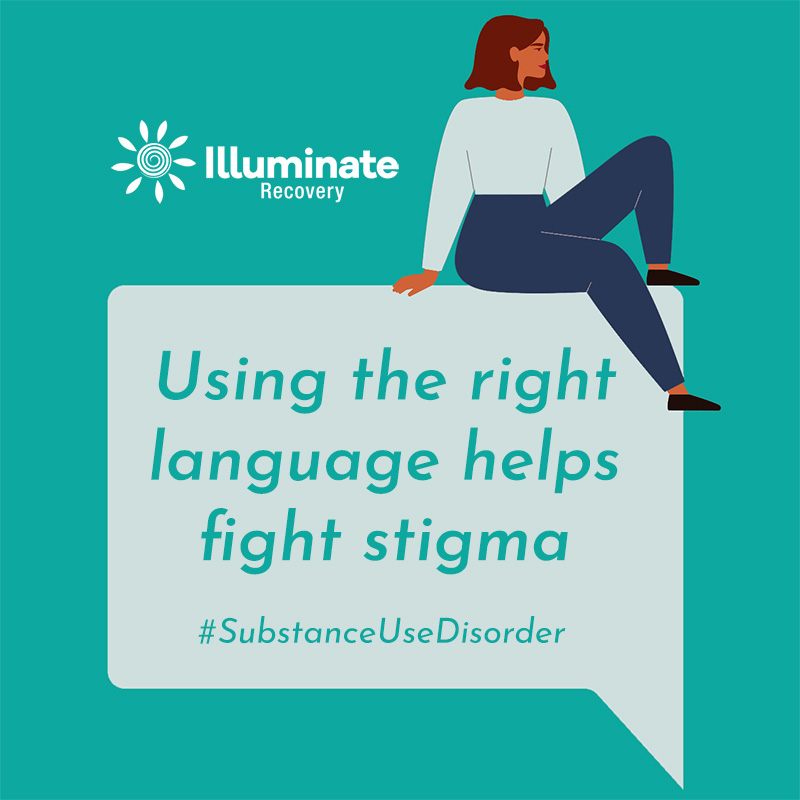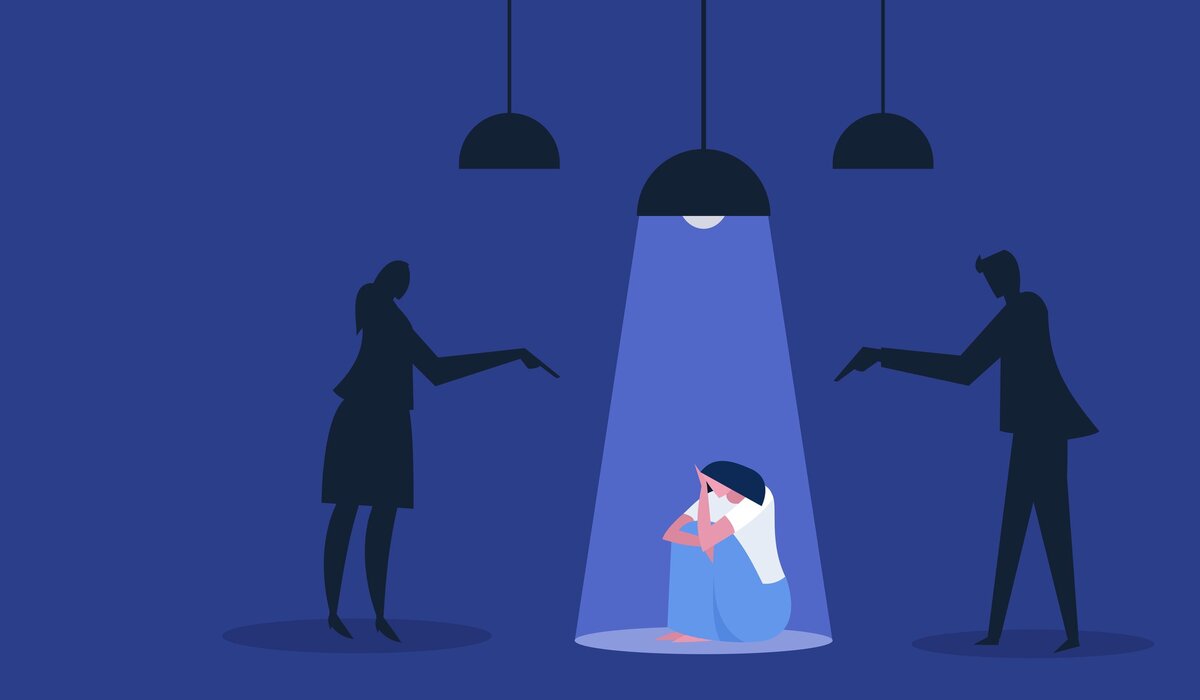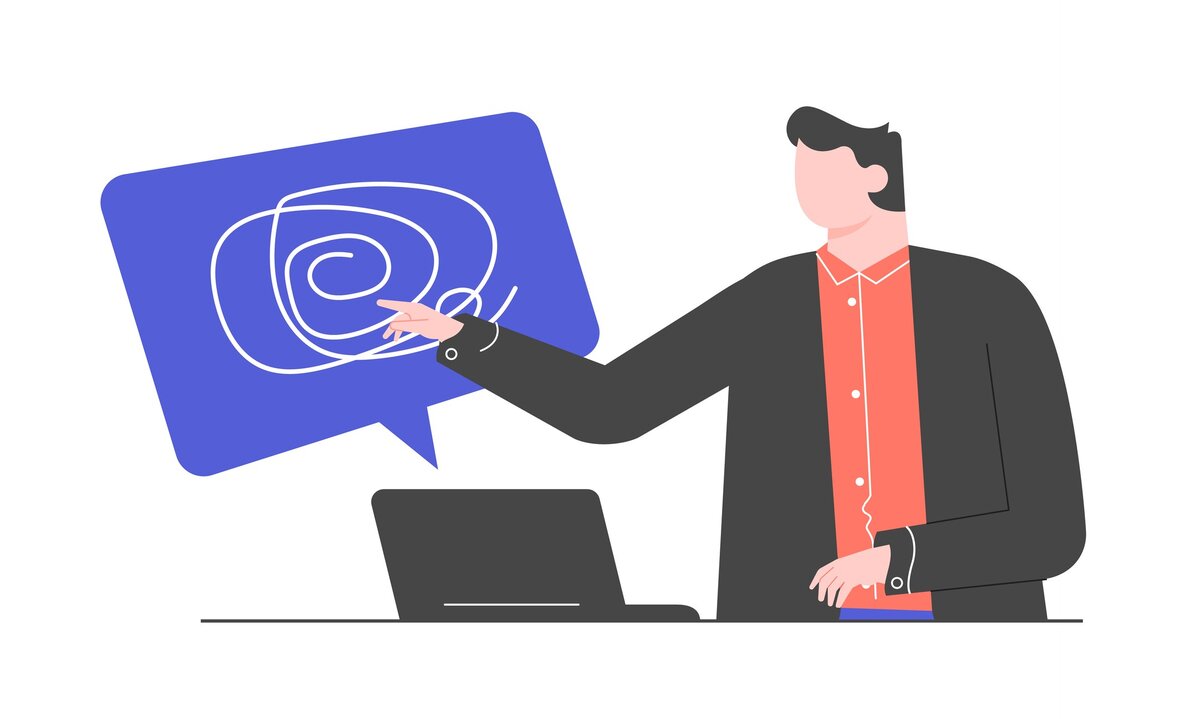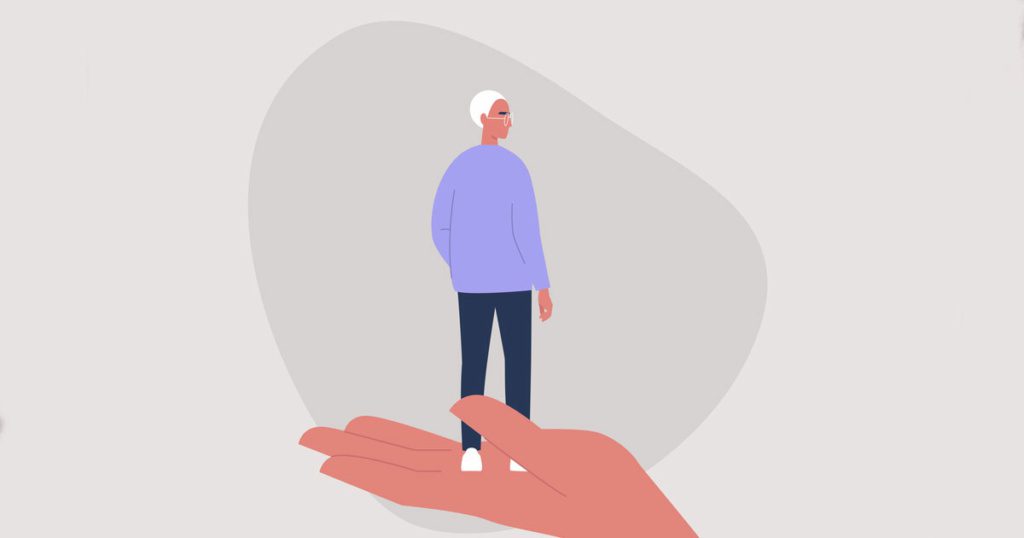Substance use disorder (SUD) is a disease, not a moral weakness. The sooner we understand and treat it as such, the sooner more people will have access to the necessary treatment. To help more people get the treatment they need, we must learn to think of SUD as we would any other disease and stop stigmatizing the issue and the individuals affected by it.
Language has power, and the words we use frame the way we think about certain issues and people. We must use the right words when talking about sensitive subjects such as substance use disorder. Making a point to use language that frames SUD as a mental health issue rather than as a choice or a crime allows us to show sensitivity and respect for the people and families affected by SUD.

Using the right language helps fight stigma and enables more people to have the confidence to seek treatment. Due to the stigma surrounding SUD, many people feel shame or fear to seek help or to admit they have a problem. If we start accepting SUD as the chronic but treatable disease that it has been proven to be, we can eliminate the stigma and make treatment more accessible and desirable to the individuals who need it the most.
Is Addiction Really a Brain Condition?
Many people struggle with dependencies on certain substances, not just because of the way they make them feel but because of how it changes their brains. The science and sociological factors behind addiction are complex. Certain drugs and alcohol cause a disorder of the brain circuits in which the reward, stress, and self-control centers of the brain are physically altered. After looking at pictures and analyzing the brains of people with drug addictions, and those without, scientist Alan Leshner discovered a shocking and significant difference between the two groups. The effect addiction has on the brain is significant enough to be visible in pictures. Leshner conducted this research in the 1980s, and since then, addiction has been widely recognized as a treatable brain disease.
What Causes SUD?
Of course, SUD is a complex and multifaceted issue. Changes to the brain’s circuitry and reward systems do not account for other questions, such as why many people try drugs and never develop an addiction to them, while others develop drug or alcohol dependencies right away. It also doesn’t account for the sociological factors that often drive people to start using substances in the first place. There are a number of sociological and environmental factors that lead many people to start using addictive substances, such as social stress, loneliness, poverty, violence, depression, and pre-existing mental illness.
These environmental situations can help push an individual to start using substances, but it does not explain why some people start using compulsively while others do not. Unfortunately, there is no cut-and-dry answer. Everyone is different; their backgrounds, lifestyles, genes, and brains are different, and so the ways their bodies and brains react to substances differ. However, scientists have found that specific gene variants can have more resilience or a more significant risk of developing SUD. In other words, whether a person will develop a dependency on drugs or alcohol can be, in many cases, genetic. Considering this combination of genetics, environment, and brain circuitry, it is clear that SUD is a medical condition like any other disease. Sadly, society still doesn’t treat SUD with the same level of compassion and understanding as it does other diseases.
What Is Stigma?
 Stigma is discrimination against a particular group, race, or nation of people. Stigmas affect many people all over the world. Sometimes, people propagate stigmas unintentionally because certain stigmas can be built into the framework and semantics of a community or culture. Stigmas about people with SUD often include inaccurate or unfounded ideas that they are all dangerous, at fault for their condition, incapable of managing a normal life, or incapable of seeking out and undergoing treatment.
Stigma is discrimination against a particular group, race, or nation of people. Stigmas affect many people all over the world. Sometimes, people propagate stigmas unintentionally because certain stigmas can be built into the framework and semantics of a community or culture. Stigmas about people with SUD often include inaccurate or unfounded ideas that they are all dangerous, at fault for their condition, incapable of managing a normal life, or incapable of seeking out and undergoing treatment.
How Stigma Affects People With SUD
Unfortunately, many stigmas and opinions about people with SUD are based on outdated beliefs that SUD results from moral failure. Instead of treating SUD as a mental condition, it is often viewed as the result of a lack of willpower, weakness, or bad choices.
Stigmas can make people with SUD feel ashamed of their condition, and therefore in denial, or just too embarrassed to admit their problem and seek the proper treatment. Stigmas can make others feel anger, fear, resentment, and distrust toward people with SUD, encouraging them to self-isolate from anyone struggling with a substance dependency. This makes it harder for people with SUD to feel supported and connected to others, which can lead to an increased sense of loneliness and depression and an unwillingness to seek help. Stigmas can also affect the way health care workers interact with patients with SUD. When health care workers have certain negative perceptions of patients with SUD, they can adversely affect the quality of care that patient receives.
How We Can Change Stigmatizing Behavior
One of the first things we can do to change stigmatizing behavior toward people who struggle with SUD is to change the way we talk about or to people with SUD. Using non-stigmatizing language with your friends, family, or acquaintances struggling with SUD will help them to feel less ashamed and ostracized because of their condition. Individuals who feel supported and accepted by friends and family are more likely to seek treatment and have a successful recovery.
Using non-stigmatizing language and behavior is especially important for anyone working in the medical industry. Health care professionals are often among the first points of contact for individuals suffering from SUD; it is especially important that they learn how to use people-first language and take all possible steps to reduce stigma and negative bias.
Terms to Use and Avoid When Talking About Addiction
 We can help eliminate harmful stigmas by changing the language we use to talk about SUD. As we already mentioned, language can shape the way we think about certain people and how they think about themselves. By replacing certain harmful or damaging words and phrases with less stigmatizing ones, we can begin to reshape the general perception of SUD. We can change the attitude by changing the words.
We can help eliminate harmful stigmas by changing the language we use to talk about SUD. As we already mentioned, language can shape the way we think about certain people and how they think about themselves. By replacing certain harmful or damaging words and phrases with less stigmatizing ones, we can begin to reshape the general perception of SUD. We can change the attitude by changing the words.
Here is a list of some common stigmatizing language and a few reasons they should be avoided.
We have also provided several acceptable alternatives for each.
Abuse/Abuser—“She’s a Drug Abuser”
The words “abuse” and “abuser” are associated with violence. These words have a high association with punishment and judgment. Saying, “She’s a drug abuser” places blame on the individual with the addiction rather than positioning it as a medical condition.
What to say instead: “Use” or “misuse.” When talking about illicit drugs, we can say “use,” as in “She uses drugs.” We can say “misuse” when talking about prescription drugs consumed outside of their medical parameters. For example, “He misuses prescription drugs.”
Addict—“He’s an Addict”
Defining a person as an “addict” positions the person to be the problem rather than that the person has a problem. Other related words include alcoholic, junkie, druggie, crackhead, doper, drunk, drunkard, pothead. These words promote stigmas by placing the individual with SUD in a position of blame. These labels also imply a permanency to the condition. Instead, we should use words that emphasize the medical and treatable nature of the condition.
What to say instead: A person with substance use disorder (SUD), a person with an addiction, a person with an alcohol/drug problem, a person struggling with addiction.
User—“That Guy’s a Drug User”
The word “user” is similar to the word “addict” because it tends to define the person by their addiction. It positions drug or alcohol misuse as a choice rather than a condition.
What to say instead: A person who uses substances/alcohol/opioids.
Clean/Staying Clean/A Clean Test—“He Needs to Get Clean”/“Her Test Was Clean”
Instead of talking about SUD as a medical illness, words like “clean” and “dirty” associate illness symptoms with filth. It implies that a person struggling with addiction is inherently dirty or socially unacceptable. The same is true when referring to drug tests as either “clean” or “dirty” instead of positive or negative. Using words like this is degrading and dehumanizing to individuals with SUD.
What to say instead: a negative test, testing negative, being in remission or recovery, not actively taking drugs, a person no longer using drugs/alcohol, not drinking or taking drugs
Dirty/Dirty Test—“Her Test Came Back Dirty”
Again, referring to a person or a positive test result as dirty is disrespectful and humiliating. It does not encourage a person’s sense of self-efficacy or hope for change.
What to say instead: Testing positive for drugs, a positive drug test, a person who uses drugs.
Habit—“She Has a Drug Habit”
Calling an addiction a habit is a gross simplification of the issue and implies that addiction is a choice. Whereas a habit can be broken or formed by applying just a little bit of willpower, addiction is much more complicated. Because addiction is a disease of the brain, it requires proper medical treatment and commitment and cannot be simply broken by exerting a little bit of will.
What to say instead: Substance use disorder (SUD), active addiction, non-medical drug use, unhealthy drug/alcohol use, risky use, person who suffers from substance use disorder.
Opioid Substitution or Replacement Therapy
Using Suboxone, Methadone, and Vivitrol in a carefully monitored medical setting can effectively treat patients with opioid addiction. Referring to these treatment options as drug replacements lessens the validity of the treatment. It also implies that the patient is still actively using drugs. In fact, using medication-assisted treatment and behavioral counseling works to stop the dangerous, addictive behavior, not replace it.
What to say instead: opioid agonist therapy, medication treatment for opioid use disorder (OUD), pharmacotherapy.
Addicted Baby—“She Had an Addicted Baby”
Babies cannot be born addicted because addiction is a developed behavioral disorder. Instead, babies born to mothers with SUD are sometimes born exhibiting withdrawal symptoms. Using accurate, medically directed language allows the baby’s condition to be treated with the same respect given to babies with other medical conditions.
What to say instead: a baby with signs of withdrawal from prenatal drug exposure, a baby with neonatal withdrawal, newborn exposed to substances.
Using People-First Language in Recovery
 To help more individuals with SUD feel confident in seeking recovery and ensure they receive the help they need, eliminating stigmatizing language is a must. Instead, individuals and health care workers need to learn to use people-first language when talking about addiction or let them choose how they or their condition is described. By using people-first language and eliminating stigmatizing words and phrases that reduce people to their condition, we can maintain the integrity of the induvial and distinguish them from their illness.
To help more individuals with SUD feel confident in seeking recovery and ensure they receive the help they need, eliminating stigmatizing language is a must. Instead, individuals and health care workers need to learn to use people-first language when talking about addiction or let them choose how they or their condition is described. By using people-first language and eliminating stigmatizing words and phrases that reduce people to their condition, we can maintain the integrity of the induvial and distinguish them from their illness.
Illuminate Recovery is a substance use disorder treatment center that values each of our patients’ qualities and individuality. We believe in helping each person discover the underlying causes and conditions that led to their chemical abuse and working together to design a treatment plan that’s tailored to the individual. Our staff creates treatment plans specifically designed for each patient that focus on treating the whole person—mind, body, and soul.
If you are ready to take your first step on the road of recovery, contact Illuminate Recovery today to learn more about our treatment options and facilities.




